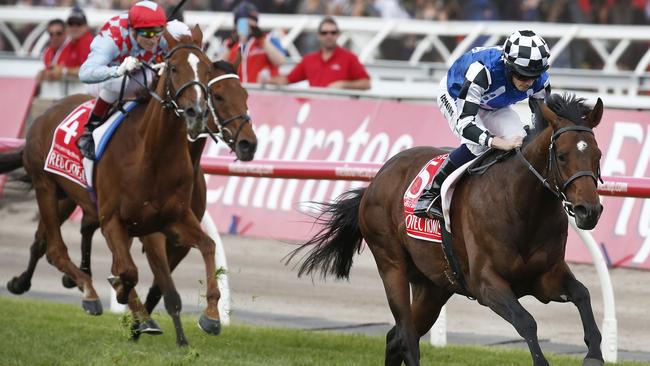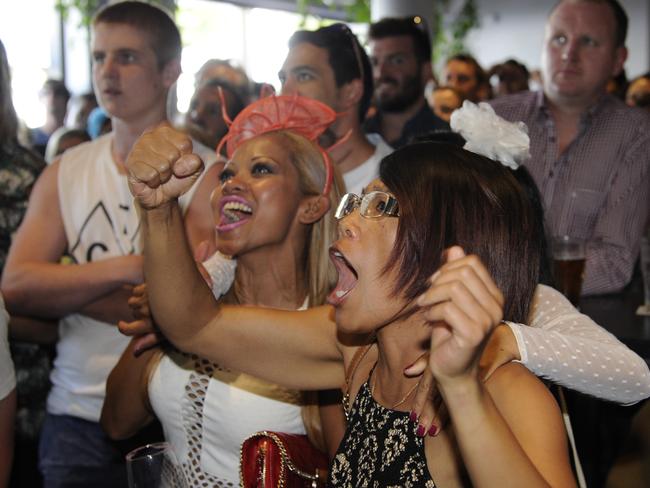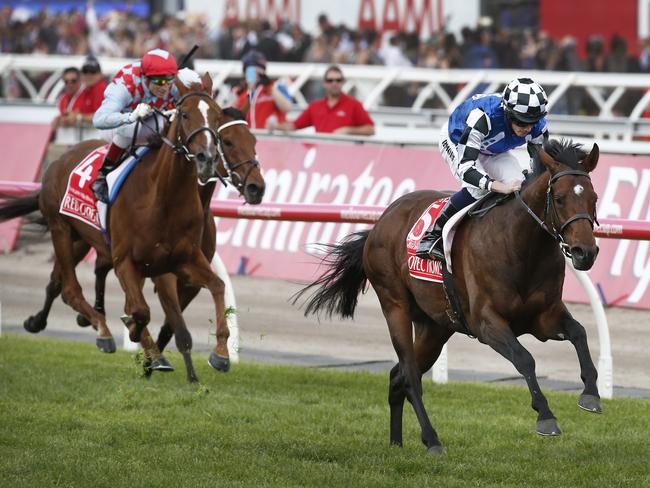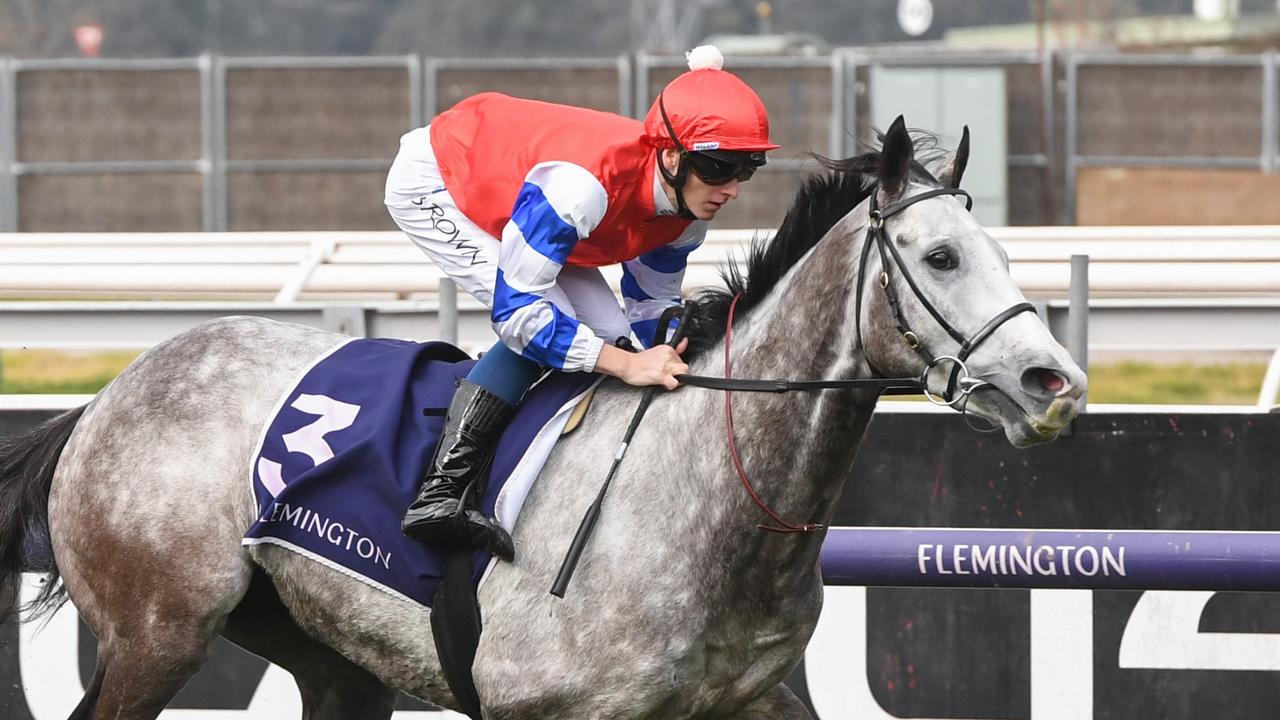Melbourne Cup: How to sound like an expert
BAFFLED by all the Cup terminology? Confused as the office experts talk racing? Here’s our beginner’s guide to some key racing phrases that could come in handy in the lead-up to the great race.

Melbourne Cup
Don't miss out on the headlines from Melbourne Cup. Followed categories will be added to My News.
THERE are few more satisfying feelings than looking like you know what you’re talking about when discussing the Cup with your mates.
If you don’t know your nays from your neighs, here’s our beginner’s guide to some key racing phrases that could come in handy in the lead-up to the great race.
You’ll be talking — and acting — like a race-hardened turf aficionado before you know it. Happy punting!
THE KEY PHRASES TO USE
What do you like in the next?
IT’S simple. It’s vague. But it’s the easiest and best way to start up a conversation at the track on local TAB outlet, regardless of where you’re sitting, what you’re wearing and who you’re with. Not only will it make you sound like you know what you’re talking about, it might result in a tip coming back your way.
I’m on the [insert no. here] the win*/each-way
PUNTERS often use a horse’s saddlecloth number over the name unless, of course, it’s a rolled gold star of the turf or fan favourite ie Black Caviar, Makybe Diva and more recently The Cleaner and Chautauqua.
*Nose can be used to replace the term win in straight-up/first-past-the-post bets.
What do you like in the Cup*?
THE default setting for Average Joe Punter is the favourite, Red Cadeaux and whatever Damien Oliver is riding ... not the worst start given Ollie’s ridden three Cup winners, Big Red’s run second on three separate occasions and favourites boast a handy record in the two-mile classic. Why not box them up in a trifecta? Others will choose horses on their name [Who Shot Thebarman will no doubt be popular again after finishing third in the race last year] or “lucky” number between one and 24. I’ll be on the 5 and 18 for what it’s worth.
* Only wannabes use “The Melbourne Cup” in conversations. 95% of the time it’s implied ‘The Cup’ is the Melbourne Cup — the race that stops a nation. Of the remaining 5%, 4.5 is reserved for the week of the Caulfield Cup and 0.5 for the quite forgettable Australian movie, The Cup, released in 2011.
What do you like in the [Feature Race here]?
SIMILAR to the Cup, this usually relates to the main race(s) on each of the four days. Think Derby, Cup, Oaks and Stakes. Exceptions to the rule might include the Mackinnon Stakes (Derby Day) and fan favourite Greys race on Oaks Day.
Dad joke alert: What do you like in the next? The Grey.
WHAT DOES THAT EVEN MEAN?!

Greg Miles
First, it’s worth noting the voice you hear calling the races at Flemington will almost certainly be Greg Miles.
He is a legendary broadcaster who by 2.35pm on the first Tuesday in November will have called more Melbourne Cups than anyone else on the planet.
He already holds the record for the most Caulfield Cups and Cox Plates.
Listening to Miles is easy. He rarely if ever goes over the top; sets the scene well and finishes off his races just as well as the winners.
Importantly, Miles provides punters with an insight on how the race is being run.
KEY PHRASES TO UNDERSTAND
(and nod, knowingly, after hearing them)
Overracing or pulling its head off
Not what you want to be hearing especially in the longer races. Basically it means the horse is going too hard too soon and is certain to be one of the first beaten when the chips are down.
Wide no cover
Not ideal but can be overcome by a talented horse and jockey. The horse is running wide — outside horses — and into the breeze with “no cover”. The key here is to find cover — drop in behind another runner — and come off heels [see next entry] in the straight. Option B is to go forward and try and dictate the race from the front.
Getting a cart or tracking into the race
Think cycling and the rider sitting two or three back getting dragged into the race without having to do as much of the work. Ideal scenario especially in the longer races.
Box seated or taking a sit
Your horse jumped well out of the barriers and settles just off the speed, conserving energy for one big crack at them at the finish.

Backed off the map
This is what you want after you’ve already placed your bet with the bookies. A tonne of money is coming for your selection which suggests it’s there to run a big race.
Got the blows
Not ideal as the selection — often a favourite or close to — drifts late in the betting markets. Has something gone wrong? Maybe. Is the horse not suited to the pattern of racing? Likely. Is something up? Almost certainly. Trouble brewing.
Missed the kick
The start of races is crucial no matter the distance from the barriers to the winning post. Miss the start and it’s panic stations, could be strung out wide or have to settle well back in the field and ride for luck along the rails hoping for gaps to appear.
Tight or hard hold
The jockey is having to restrain the horse from going harder and or faster in the early to middle stages of a race. Can be a good or bad thing depending on where in the run it happens. If you hear Miles say your horse is under a hold entering the straight start counting your money. Doing it easy.
Originally published as Melbourne Cup: How to sound like an expert


